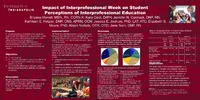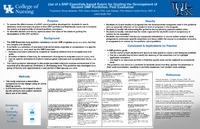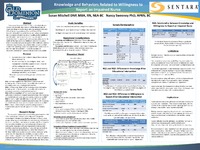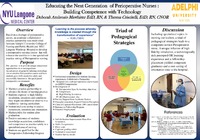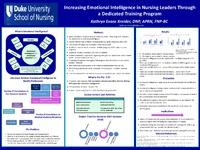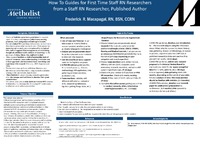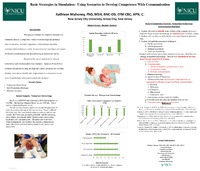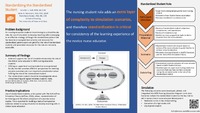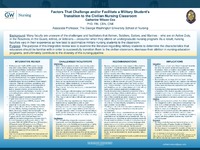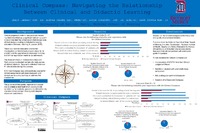» Posters
Impact of interprofessional week on student perceptions of interprofessional education
Interprofessional Education (IPE) Week featured panel discussions, lectures, and experiential learning activities, such as serious games and simulations. This study discusses impacts of IPE Week on students’ perceptions of interprofessional education, measured by the Student Perceptions of Interprofessional Clinical Education-Revised, and compares results based on the type of activity attended.
Conference Identifier: NERC20PST94
Use of a DNP essentials-based rubric for guiding the development of student DNP portfolios
A DNP portfolio rubric/guideline that was developed for students to use to help them determine what exemplars to place in their DNP portfolio and that faculty could use to evaluate the quality and applicability of student portfolio documents will be presented.
Conference Identifier: NERC20PST88
Knowledge and behaviors related to willingness to report an impaired nurse
Based on a nurse-led, educational presentation on the impaired nurse profile, will assess the difference in knowledge of direct/ non-direct care nurses; and the difference in willingness to report an impaired nurse before and after receiving a nurse-led educational intervention on the impaired nurse profile.
Conference Identifier: NERC20PST91
Educating the next generation of perioperative nurses: Building competence with technology
Including specialized topics in nursing curriculum, a triad of pedagogical strategies leads to a competent novice Perioperative nurse. A unique infusion of high fidelity simulation, a technologically rich precepted OR learning experience and a fellowship placement yielded competent graduates and a cost saving of orientation time to the hospital.
Conference Identifier: NERC20PST85
Increasing emotional intelligence in nursing leaders through a dedicated training program
This presentation highlights the importance of emotional intelligence in nurses and describes a pilot study designed to enhance emotional intelligence in nurse practitioner students. The pilot study (n=43) demonstrated that emotional intelligence traits such as flexibility, stress tolerance, optimism, and decision making showed statistically significant increases over the year-long intervention.
Conference Identifier: NERC20PST79
How-to guides for first time staff RN researchers, from staff RN researcher, published author
Advice and tips from a first time bedside staff RN researcher/ published author to potential staff RN researchers/ authors on how to start, fund, form teams, gather and analyze data, submit completed research project for conferences and publication.
Conference Identifier: NERC20PST83
Basic strategies in simulation: Using scenarios to develop competence with communication
Use of simulation for clinical scenarios is a valuable tool. Clinical experiences that offer communication opportunities may be limited. The appraisal of students ability to effectively communicate in an inter-professional manner is a skill that should be woven into every clinical scenario.
Conference Identifier: NERC20PST84
Standardizing the standardized student
The purpose of this presentation is to review evidence related to using standardized students in clinical teaching scenarios, share examples of scenarios incorporating standardized students that have been developed from best practice resources, and describe use of the NLN Jefferies Simulation Theory to standardize terminology and organize outcome data.
Conference Identifier: NERC20PST64
Factors that challenge and/or facilitate a military student’s transition to the civilian nursing classroom
Military nursing students bring a variety of experiences to the classroom but they may also present with some unique challenges that educators should be cognizant of in order to successfully transition them to the civilian classroom, decrease their attrition, and ultimately contribute to the diversity of the nursing pipeline.
Conference Identifier: NERC20PST32
Clinical compass: Navigating the relationship between clinical and didactic learning
A consistent framework is necessary to guide students, classroom faculty, and clinical instructors. The purpose of this quality improvement project is to create a new tool which would provide consistency for students, guidance to clinical faculty, improve clinical decision making, and integrate classroom and clinical.
Conference Identifier: NERC20PST80
